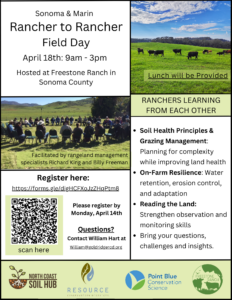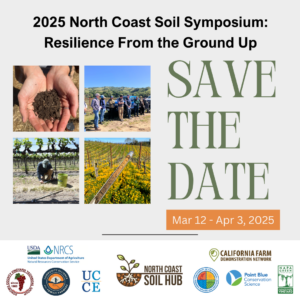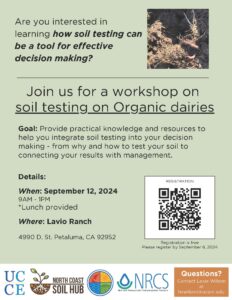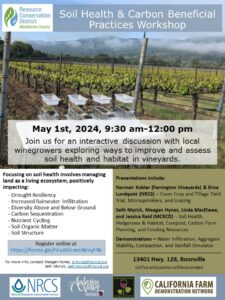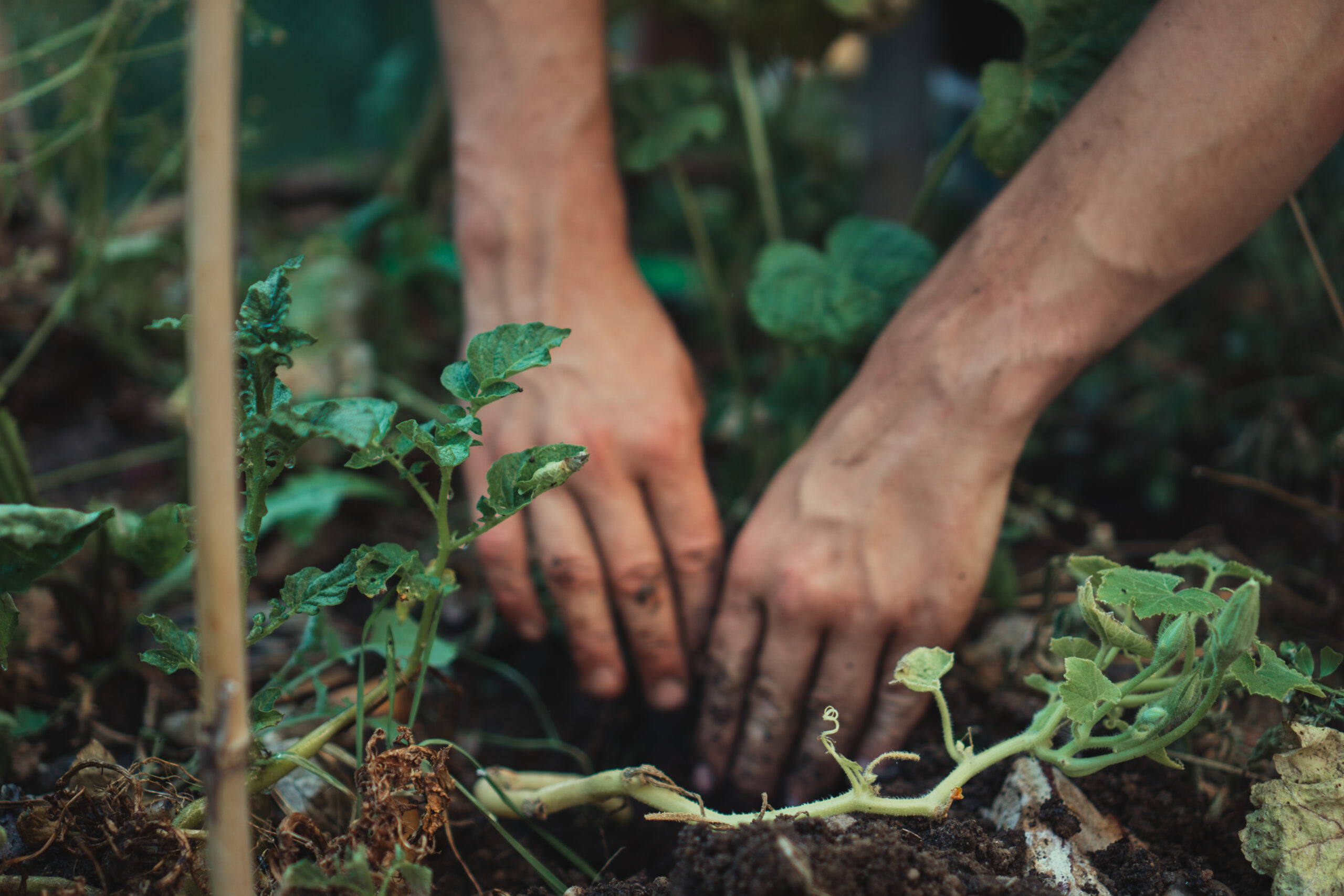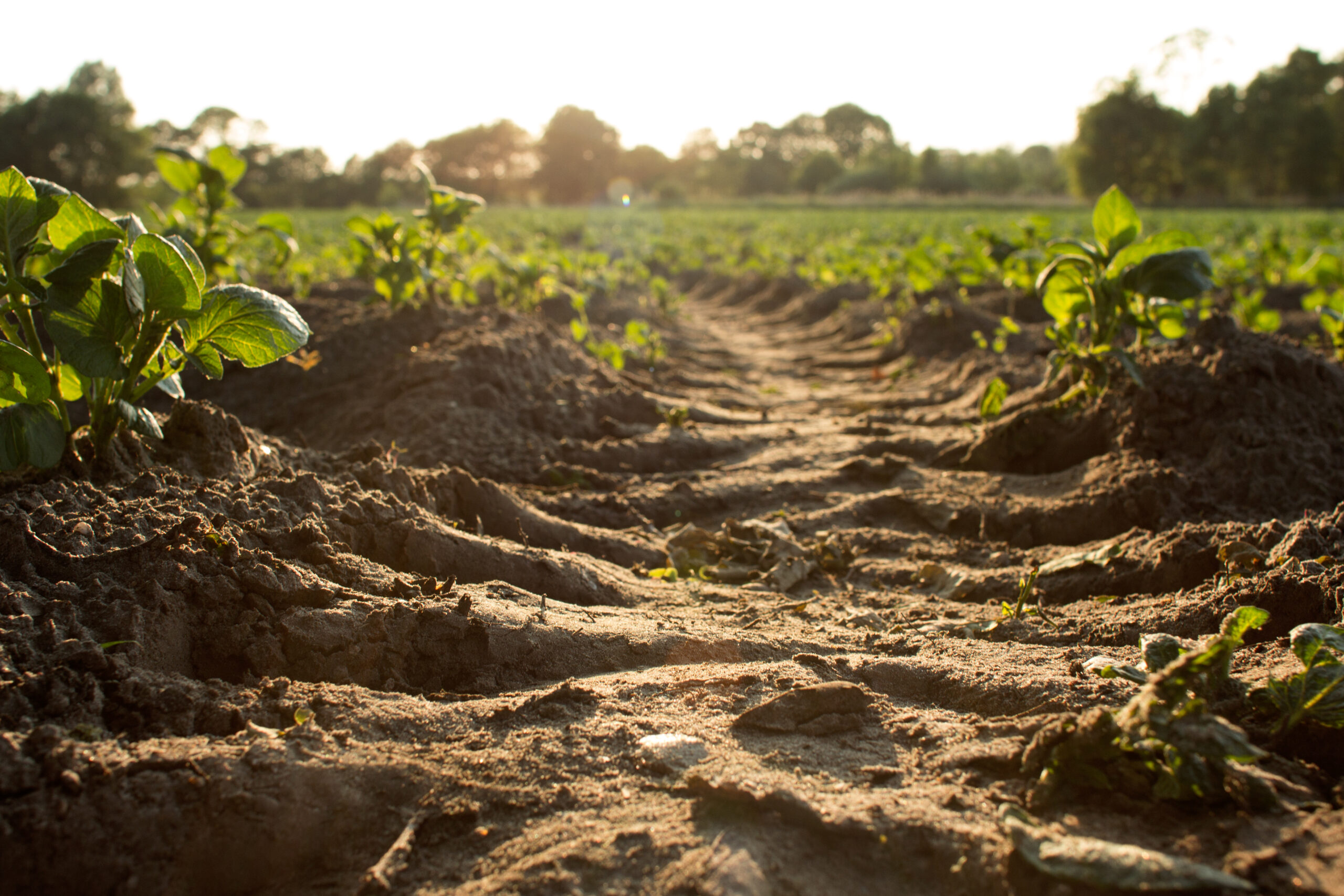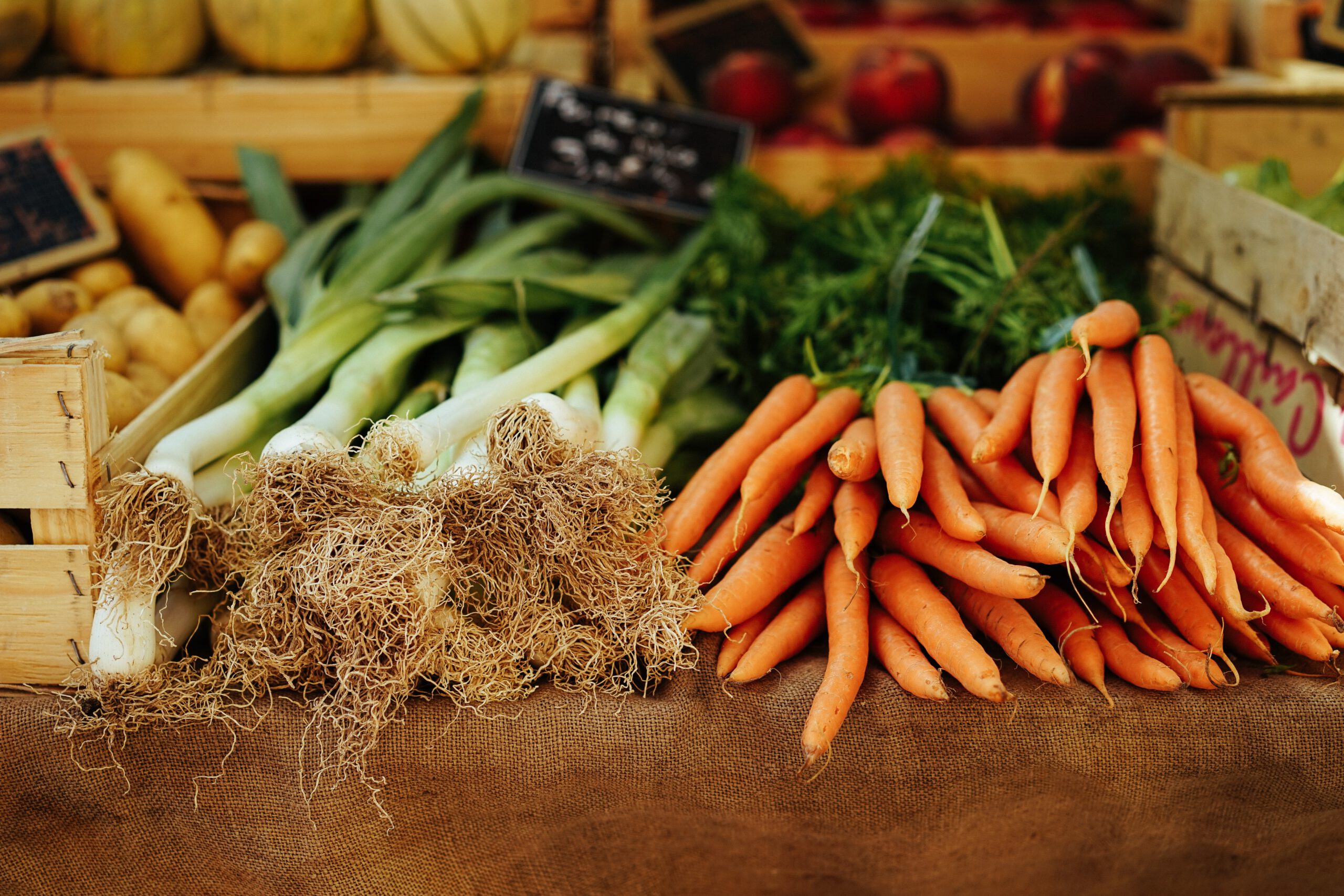Scroll down for recordings of each day
The North Coast Soil Hub’s fourth annual Soil Health Symposium will be held virtually from 8:30 am – 12 pm on March 11-12, 2021. This year’s Soil Health Symposium will bring together growers, land and vineyard managers, scientists, agency representatives, and others to provide an overview of soil health in our region. Topics will include potential climate change impacts and
solutions, cutting-edge practices, and the latest data from the field.
The first day will focus on Climate Change and Soil Health on the global and regional scales, as well as an overview of the North Coast Soil Hub project.
The second day, Shop Talk: Soil Health in the Field, will feature growers and researchers discussing under vine management practices improving soil health, compost and the soil biome, and the benefits of integrating livestock into agricultural systems. We will end the day hearing about how soil health factors into a business’s economics and marketing.
Registration is free and open to the public.
Day 1
Day 2
Speakers will include:
• Dr. Greg Jones (Linfield University, McMinnville, Oregon)
Dr. Greg Jones is the Director of the Evenstad Center for Wine Education, holds the Evenstad Chair in Wine Studies, and is a professor and research climatologist in the Department of Environmental Studies at Linfield University. He specializes in the study of climate structure and suitability for viticulture, and how climate variability and change influence grapevine growth, wine production and quality. He conducts applied research for the grape and wine industry in Oregon and has given hundreds of international, national, and regional presentations on climate and wine-related research. He is the author of numerous book chapters, including being a contributing author to the 2008 Nobel Peace Prize winning Intergovernmental Panel on Climate Change Report, and other reports and articles on wine economics, grapevine phenology, site assessment methods for viticulture, climatological assessments of viticultural potential, and climate change.
• Greg Pennyroyal (Wilson Creek Winery)
In addition to Vineyard Manager at Wilson Creek Winery and Vineyards in Temecula, California and Viticulture Professor at Mt. San Jacinto Community College, Greg is also Co-Chair of the Temecula Valley Wine Growers Association Viticulture Committee and Founder of the Small Winegrowers Association. He is the President of the Global Institute for Tibetan Medicine researching neurodegenerative diseases in conjunction with the University California, Santa Barbara. Other research includes chemotypical and genetic markers research for regenerative agriculture plant photosynthesis and secondary metabolite efficiency; partnering with Clemson University to develop plant based biodegradable plastic; and NIH research resulting in a patent for the Gene Expression Assay characterization of botanical medicine.
Among his many endeavors and accomplishments, Greg has previously served on the USP Good Agricultural Practices Committee, as a Director of Botanical Research at the Leiner Health Products Science Center, and as the Business Manager at Trout Lake Farm, the largest organic medicinal herb farm in North America.
• Dr. Lisa Micheli (Pepperwood)
Dr. Lisa Micheli is the President and CEO of Pepperwood and the Dwight Center for Conservation Science. She started her career at the US Environmental Protection Agency and then completed her graduate studies at UC Berkeley as a NASA Earth Systems Research Fellow in 2000. She now focuses her research on relationships between climate, wildfire, watershed health, and biodiversity and has published numerous peer-reviewed studies on river restoration, climate adaptation, and community-based approaches to biodiversity conservation.
Dr. Micheli specializes in facilitating interdisciplinary collaborations focused on using relevant research to craft collective solutions to today’s most pressing landscape conservation challenges. She serves as the co-chair of Pepperwood’s Terrestrial Biodiversity Climate Change Collaborative (TBC3), a National Science Foundation funded Bay Area climate adaptation research initiative, with Dr. David Ackerly, Dean of UC Berkeley’s College of Natural Resources. She also chairs the Golden Gate Biosphere Reserve team of the international Large Landscape Conservation Peer Network facilitated by the Lincoln Institute of Land Policy. She has been recognized as a Phi Beta Kappa scholar, a Robert and Patricia Switzer Foundation Environmental Leader, a Bay Nature Institute Local Hero for Environmental Education, and a Fellow of the California Academy of Sciences. She is a member of the American Geophysical Union and the Society for Conservation Biology. Dr. Micheli serves as a director of the Rebuild North Bay Foundation and as a science advisor to the Sempervirens Fund, the Chile-California Conservation Network, the Bay Area Open Space Council, and the Water Research Foundation.
• Dr. Miguel Garcia (Napa County RCD)
Miguel is currently the Sustainable Agriculture Program Manager at Napa County RCD. Before joining the Napa team, Miguel worked for the Coachella Valley and the Inland Empire RCDs developing and implementing diverse sustainable agriculture programs. He has a PhD in Environmental Sciences and a B.S. in Chemistry from UC Riverside. Miguel provides on-farm technical assistance and planning related to soil health, erosion control, and irrigation management. He also designs educational programs aiming at providing local growers with valuable information on various topics related to sustainable agriculture. Miguel believes the future well-being of our local water resources and the world’s food security lies heavily on the implementation of adequate sustainable agriculture practices today. By working one-on-one with growers, he believes true change can be attained. When not at the RCD, Miguel enjoys spending quality time with his wife and two kids.
• Dr. Shannon Cappellazzi (Soil Health Institute)
Dr. Shannon Cappellazzi is Courtesy Faculty at Oregon State University and serves as the Lead Scientist for the North American Project to Evaluate Soil Health Measurements at the Soil Health Institute. She also serves as the liaison for the western United States and is the disciplinary lead for the Institute’s analysis of soil health in pastures and rangelands. Dr. Cappellazzi previously served as Manager at the Oregon State University Central Analytical Laboratory where she started her collaboration with the North Coast Soil Hub. Earlier in her career, she managed the organic transition for Wheelbarrow Creek Ranch and worked as an agricultural commodities trader for Wilbur-Ellis Company. Dr. Cappellazzi is a member of the Soil Science Society of America and serves as a board member of the Oregon Society of Soil Scientists and Oregon Forage and Grassland Council. She received her B.S. in Animal Science and her M.S. and Ph.D. degrees in Soil Science from Oregon State University.
• Kari Flores (Robert Sinskey Vineyards)
Kari Flores is the Farming Operations Manager for Robert Sinskey Vineyards, where she has worked in various capacities for over 6 years. Kari has a strong commitment to organic agriculture, and has been farming organically (and Biodynamically) for 20 years. She knows the importance of sustainable and regenerative farming practices that promote soil health and are both economically viable and environmentally sound. At Robert Sinskey Vineyards Kari manages all aspects of farming wine grapes, fruit trees, olive orchards, bee yards, and sheep. Kari holds a Bachelor of Science and a Master of Science in Horticulture and Agronomy from the University of California, Davis. When she’s not roaming around Robert Sinskey’s 170 acres of vineyards, pastures, and orchards, Kari can be found tending to her own small farm, which includes a small herd of Olde English Southdown sheep, Great Pyrenees dogs and a Merlot vineyard.
• Ned Horton (Turley Wine Cellars)
Ned Horton is Vineyard Manager at Turley Wine Estates, managing 90 acres of organically certified vineyards in Napa and Sonoma Counties. Ned’s first exposure to wine was in the restaurants of Nantucket, Massachusetts where he worked as a dishwasher and prep cook in high school and college. These experiences taught him not only the love of food and wine but the value of hard work and the rewards offered from a commitment to excellence. Ned started his wine career as a cellar hand at Davis Bynum during the 2005 vintage, then worked in the Cellar and Lab at Quivira from harvest 2006 through 2008, when he moved to the vineyards for the 2009 vintage.
• Stuart Bewley (Alder Springs Vineyard)
After his first endeavor, California Cooler, Stuart Bewley has spent the latest phase of his life immersed in the study of viticulture. After careful consideration, he chose the 6,000-acre Alder Springs Ranch in Laytonville, CA for his vineyard in the early 1990s. Northern Mendocino County has a cooler climate, and the 140-acre vineyard is located at elevations between 1,700 to 2,700 feet. The vineyard is a site of incredible experimentation and opportunity, with dozens of clones of over 20 varietals. Each clone in the vineyard is planted on a rootstock that is selected for a specific reason: the soil, drainage, special growth characteristic, or for the flavor it imparts. Bewley believes the rootstock adds as much complexity to the wine as the clone does. In addition to testing out rootstocks and clones, Bewley is always trying to find the best ways to manage his soil. A big proponent of soil health, Bewley experiments with compost, biochar, mulch, and vegetative cover in the vine rows and middles, practices which also protect against erosion on the steep vineyard slopes. He is a fan of the Italian Fischer Twister that trims the ground cover and suckers vines without disrupting the soil. Bewley has been a part of the North Coast Soil Hub as a Demonstration Site, studying the impacts of mulch and compost applied under the vines.
In addition to testing out rootstocks and clones, Bewley is always trying to find the best ways to manage his soil. A big proponent of soil health, Bewley experiments with compost, biochar, mulch, and vegetative cover in the vine rows and middles, practices which also protect against erosion on the steep vineyard slopes. He is a fan of the Italian Fischer Twister that trims the ground cover and suckers vines without disrupting the soil. Bewley has been a part of the North Coast Soil Hub as a Demonstration Site, studying the impacts of mulch and compost applied under the vines.
• Kelly Mulville (Paicines Ranch)
For the past 25 years Kelly has managed and consulted with vineyards, farms and ranches throughout the western USA, Spain, Australia and China. In 2012 he was sponsored by government and wine industry organizations to give presentations and workshops on extended-season vineyard grazing throughout Australia and New Zealand. His studies include Ecological Horticulture at UC Santa Cruz, Viticulture at UC Davis and Holistic Management with Allan Savory. His work is focused on combining experience in farming and viticulture with holistic management in order to design and manage more ecologically, socially and economically sound farming practices. This usually involves a considerable amount of help from livestock. Kelly is vineyard director at Paicines Ranch and does design/advising work for vineyards
• Dr. Cristina Lazcano (UC Davis)
Dr. Cristina Lazcano is a soil biologist and assistant professor of soil ecology at the department of Land, Air and Water Resources, University of California Davis. She completed her PhD at the Soil Ecology research group from the University of Vigo (Spain). Afterwards, she worked as a postdoctoral scholar at the Technical University of Denmark, the University of Calgary and UC Davis. Before joining the faculty of UC Davis in 2019, Dr. Lazcano was an assistant professor of soil ecology at the California Polytechnic State University, San Luis Obispo. At the most basic level the research of Dr. Lazcano aims to identify the soil ecological interactions responsible for nutrient availability and retention in soils and how they can be managed to increase soil health and sustainability of agricultural production. Dr. Lazcano has worked with different crops like corn, tomatoes, strawberries and for the last five years, Dr. Lazcano’s research is focused on winegrapes. Through on farm collaborative research, Dr. Lazcano hopes to help winegrape producers understand how to improve soil health and C sequestration while producing high quality grapes.
• Ryan Johnston (Biotic Beverages)
Growing up in west Sonoma County with a big garden and a lot of time immersed in the wildlands, Ryan’s love of living systems has deep roots. He’s worked as an educator, advocate, farmer, project manager, entrepreneur and designer. He is currently Head of Marketing + Impact for Biotic Brands Kvass, a Social Purpose Corporation whose mission is to elevate vitality by producing probiotic beverages of uncompromising quality that has a regenerative impact in addressing climate change. He also works as a Carbon Farm Planner for Gold Ridge Resource Conservation District. Ryan is also a strategic advisor to Landscape Analytic Solutions on the creation of a high-resolution carbon calculator for the landscape design industry and on the advisory council for The School Garden Network. Ryan is fascinated with the psychological dimensions of resilience and regeneration as they relate to our cultural capacity to adapt and thrive in a rapidly changing world. He’s an avid fly fisherman, backpacker, gardener, forager, fermenter, and chef. He and his wife Kellen, who met while both working at Daily Acts, live in Sebastopol.
• Paul Dolan (Truett-Hurst)
First as winemaker and president of Fetzer Vineyards and then as CEO of Truett Hurst winery, fourth-generation wine-maker Paul Dolan has successfully pioneered the path to sustainability in the California wine industry. In his book, True to Our Roots-fermenting a business revolution, Paul sets forth the simple but powerful management principles that enabled Fetzer Vineyards to become one of America’s best-known wineries even as it was becoming a model for sustainable business practices. Dolan and Fetzer led the California wine industry toward profound change in how wineries and grape growers preserve their environment, strengthen their communities, and enrich the lives of their employees, and he did all this without sacrificing Fetzer’s bottom line. He introduced the first national brand, Bonterra, made from 100 percent organically grown grapes and led a transformation that put Fetzer at the forefront of organic viticulture. As a leader in the wine industry, Dolan introduced a Code of Sustainable Wine Growing to the Wine Institute and then went on to chair the Institute in 2006-2007. He served on President Clinton’s Council on Sustainability, Businesses for Social Responsibility, The Climate Group, was Chairman of the California Sustainable Winegrowers Alliance, and received the Environmental Business Leader of the Year Award from the California Planning and Conservation League in 2006. Dolan’s greatest passion, however, is Regenerative winegrowing at his family-owned Dark Horse Ranch, east of the Russian River in the foothills north of Hopland. It has been a family project and a labor of love to convert 70 acres of grapes into a multi faceted certified Biodynamic® vineyard and Regenerative farm. Paul loves farming while exploring the new emerging paradigm of Regenerative farming as he believes building the restorative capacity of the soil and the farm will act as the trim tab for restoring the health of the planets ecosystems. Paul currently acts as CEO of Truett Hurst Winery in the Dry Creek Valley of Sonoma County. His family is his daily source of inspiration.
• Julie Johnson (Tres Sabores Vineyard)
Julie Johnson is the winemaker and owner of Tres Sabores, a winery nestled into the western Rutherford bench land of the Napa Valley. Passionate about food, wine, and the land, for the last 34 years Julie has lived on Napa’s first certified organic farm, growing wine grapes (Cabernet, Zinfandel, Petite Sirah) pomegranates, lemons and olives, raising her children not to mention Golden Retrievers, Guinea Hens, and sheep. A native of California, Julie graduated from Columbia as a BSN, P.H.N. after receiving a B.A. from Bowdoin College. Relocating to the Napa Valley in 1980, she practiced nursing even as she co-founded Frog’s Leap Winery, leading the sales and marketing efforts there. Her vineyard joined many others in the 80’s in moving towards organic practices. In 1999, Julie began a new adventure, starting Tres Sabores, and soon began making her own wine. She speaks and participates in seminars on the subjects of Women in Wine and Regenerative Farming for a variety of clients and at educational venues around the country. Recently, she was a featured panelist at the World Climate Research Programme, AGU Conference. She is currently active in C.C.O.F, the Wild Farm Alliance, the Napa Vintners’ Environmental Stewardship Committee, Napa Green, the Napa Grapegrowers, ZAP, and the Rutherford Dust Society. At the end of the day, she sleeps best if she feels that she has been a thoughtful and energetic steward of the land and has capped off the day with a good glass of wine!
For the latest information on the Symposium and more soil health news, make sure to sign up for our eNewsletter and follow us on Facebook and Instagram.

